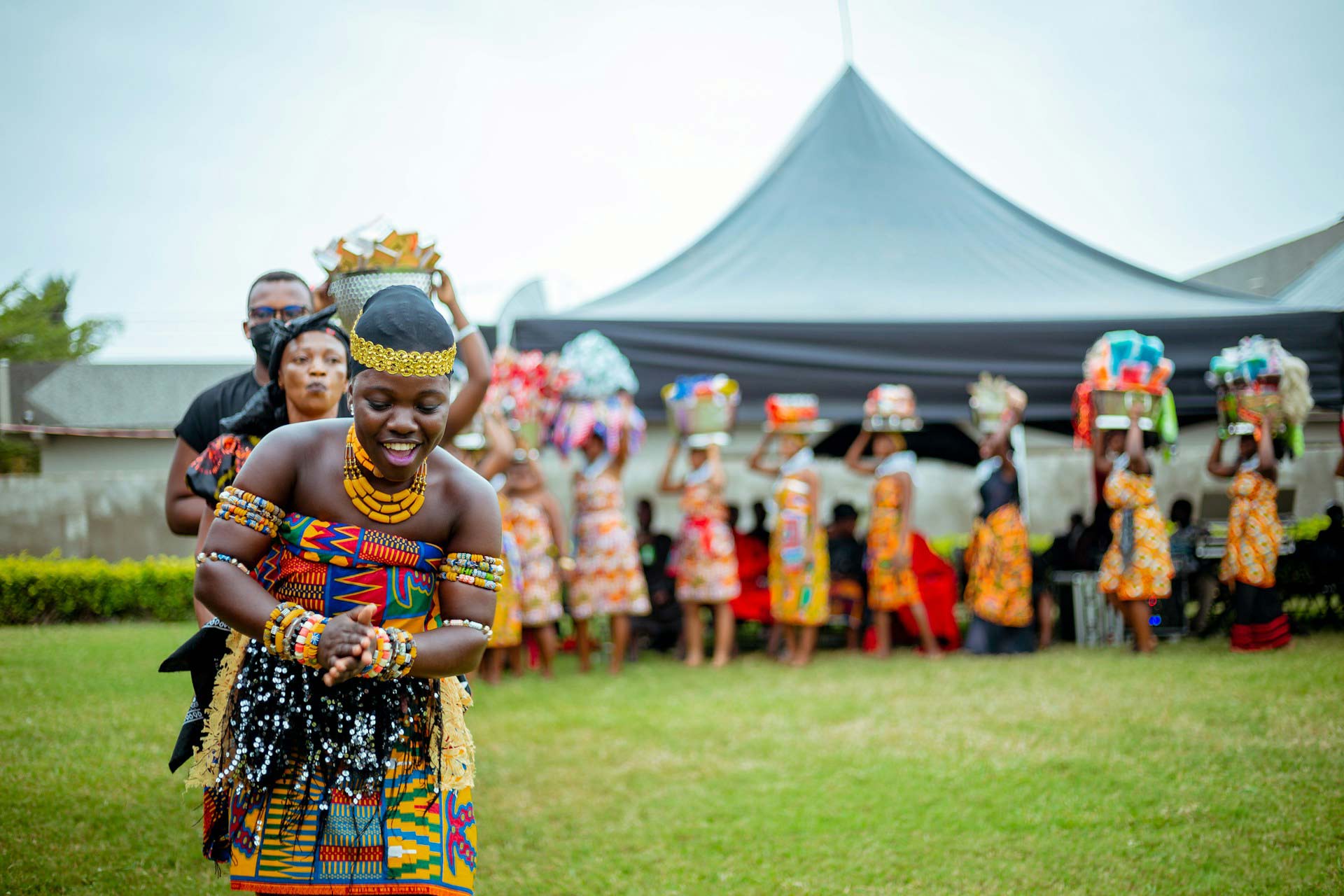Voodoo Festival: Togo, Benin & Ghana
Cultural tour & safari of Togo, Benin & Ghana
The 2025 edition is now available
Be immersed in the less-explored west African destinations of Togo, Benin and Ghana on this once-in-a-lifetime cultural odyssey. Our journey provides a unique and interactive window into the ancient cultures found here—meet a great Ashanti chief, hear the story of a settlement of “witches”, discover villages of fetish priests that have existed almost unchanged for centuries, and much more. The highlight of our trip is participating in Benin’s mysterious Voodoo Festival, complete with traditional costumes, dancing, masks and processions. Travel to this off-the-beaten-track region with the details taken care of by us, including all meals, carefully selected hotels, and an incredibly unique program of tour activities.
New this year, our 2025 departure will also feature the Akwasidae festival in Kumasi, a spectacle celebration of the Ashanti people!
| Tour Information | ||
|---|---|---|
| Duration | : | 14 days |
| Minimum | : | 02 persons |
| Maximum | : | 16 persons |
| Price (From) | : | US$ 4315 |
| International air not included | ||
Day 01: Arrive Lomé (TOGO)
Welcome to Lomé, Togo’s vibrant capital! Originally a village founded by the Ewe people in the 18th century, Lomé became the capital of the German colony of Togoland in 1897. Upon arrival at Lomé International Airport, we are met and transferred to our hotel. Check in time starts from 3:00 PM. Balance of the day is free to relax.
Overnight: Hotel Onomo, Lome (1 night)
Day 02: Lomé/Grand Popo (Drive) (BENIN)

Togo's vibrant capital, Lomé, holds a rare distinction as the only African city once governed by the Germans, British, and French. It's also among the world's few capitals bordering another nation. These unique traits shape Lomé's essence, visible in its people's lifestyles and urban architecture. We discover this lively hub of trade and cultural exchange on a city tour.
During our tour, we'll explore several key sites: the central market, renowned for its influential "Nana Benz" traders who dominate the market for the luxurious "pagne" fabric imported from Europe and distributed across West Africa (note: the market has unfortunately been partially destroyed by fire); the colonial buildings in the administrative quarter, where the ambiance of the colonial era still lingers; and the fetish market, offering an eclectic assortment of ingredients for love potions and magical concoctions.
We move to a remote village, where we'll participate in a Voodoo ceremony. Listen to the frenetic rhythm of drums and the chants of the adepts as they summon voodoo spirits. These spirits take possession of some dancers, plunging them into a deep trance. They exhibit signs of possession—eyes rolling back, grimaces, convulsions—yet remain impervious to fire or pain. Among the voodoo divinities that may manifest are Sakpata, Heviesso, and Mami Water. In this intimate setting, surrounded by the enchanting atmosphere of the ceremony, we'll come to grasp the significance of the saying: "In your churches, you pray to God; in our voodoo shrines, we become Gods!"
Afterwards, drive to Grand Popo in Benin for our overnight.
Overnight: Hotel Awale Plage, Grand Popo (1 night) (B, L, D)
(Swimming pool, ensuite rooms with aircon)
Day 03: Grand Popo/Ouidah (Drive)
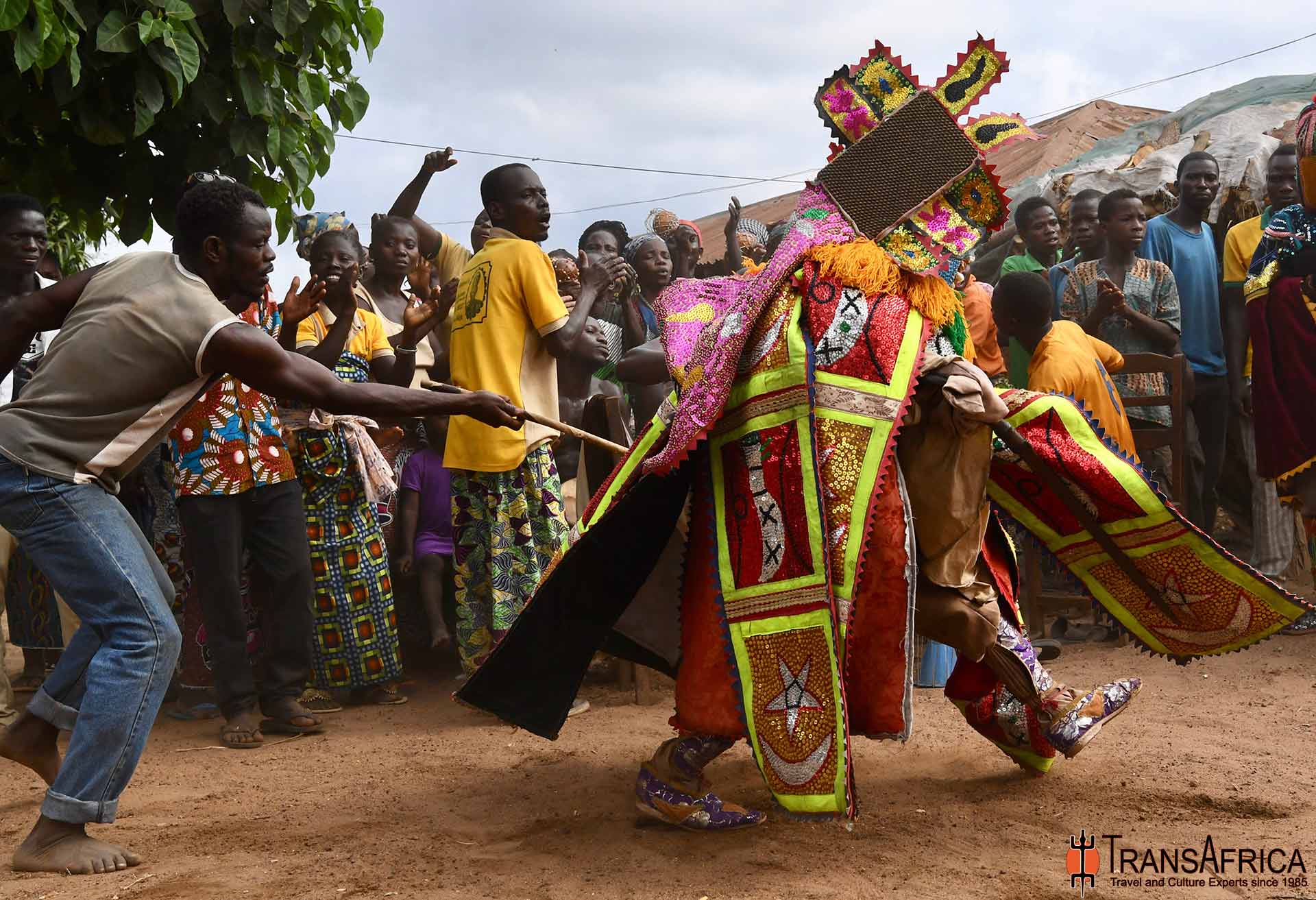
Every 10th of January marks a national celebration day in Benin, honouring traditional religion. We begin the day by driving to a lesser-known site where the Voodoo festival is celebrated in a more traditional manner, free from large crowds of tourists and urban visitors that often cause congested traffic and parking chaos. At this more intimate festival, we'll immerse ourselves in genuine Sacred Masks dances, witness Voudou followers adorned in colourful costumes and red feathers, observe high-ranking animistic priests with their entourage of initiates, and experience the rhythmic beats of drumming and dancing alongside enthusiastic villagers from the entire region.
Later, we journey to Ouidah to partake in the country's most renowned festival. Here, numerous voodoo ceremonies take place, attracting thousands of devotees, traditional leaders, and fetish priests. We'll encounter various types of masks and witness the presence of esteemed Voodoo chiefs clad in traditional attire. Since 2024, this official Voodoo festival has been organized by a committee, and the festival schedule is typically announced closer to the event date.
Overnight: Hotel Casa del Papa, Ouidah (2 nights) (B, L, D)
(Swimming pool, oceanfront bungalows with ensuire and aircon)
Day 04: Ouidah/Ganvie/Ouidah (Drive)

This morning, we complete our visit to Ouidah, once a prominent slave trading post. The historic town boasts rare Afro-Brazilian architecture and a syncretic atmosphere, where the Voudou Python Temple stands in juxtaposition with the Catholic Cathedral.
We then drive to Lake Nokwe, where we embark on a motorized boat to reach Ganvié, renowned as the largest and most picturesque African village on stilts. Home to approximately 25,000 inhabitants of the Tofinou ethnic group, Ganvié features wooden huts perched on teak stilts, with fishing being the primary livelihood. Despite enduring a long history of human presence, Ganvié has remarkably preserved its traditions and natural surroundings, with the lake remaining sustainable in terms of fishing. Daily life unfolds on the dugout canoes, skillfully navigated by adults and children alike using brightly colored paddles. These canoes serve as the backdrop for various activities, from fishing by men to trading at the "floating market" by women, and even school commutes and playtime for children.
Return to Ouidah for dinner and overnight. (B, L, D)
Day 05: Ouidah/Abomey/Dassa (Drive)

Today, Sunday, we will attend the service of the Celestial Church cult. Dozens of individuals, clad in white attire, assemble for a syncretic prayer session where Christian symbols intertwine with animist beliefs, creating a vibrant celebration filled with prayers and displays of spiritual possession. Additionally, we will witness the adept performance of Sakpata, the deity associated with smallpox, adorned with a necklace of cowry shells and engaging in spirited dance. We’ll also be treated to the spectacle of humorous masks executing acrobatic dances on stilts.
Overnight: Hotel Jeko, Dassa (1 night) (B, L, D)
(Ensuite rooms with aircon)
Day 06: Dassa/Djogou (Drive)
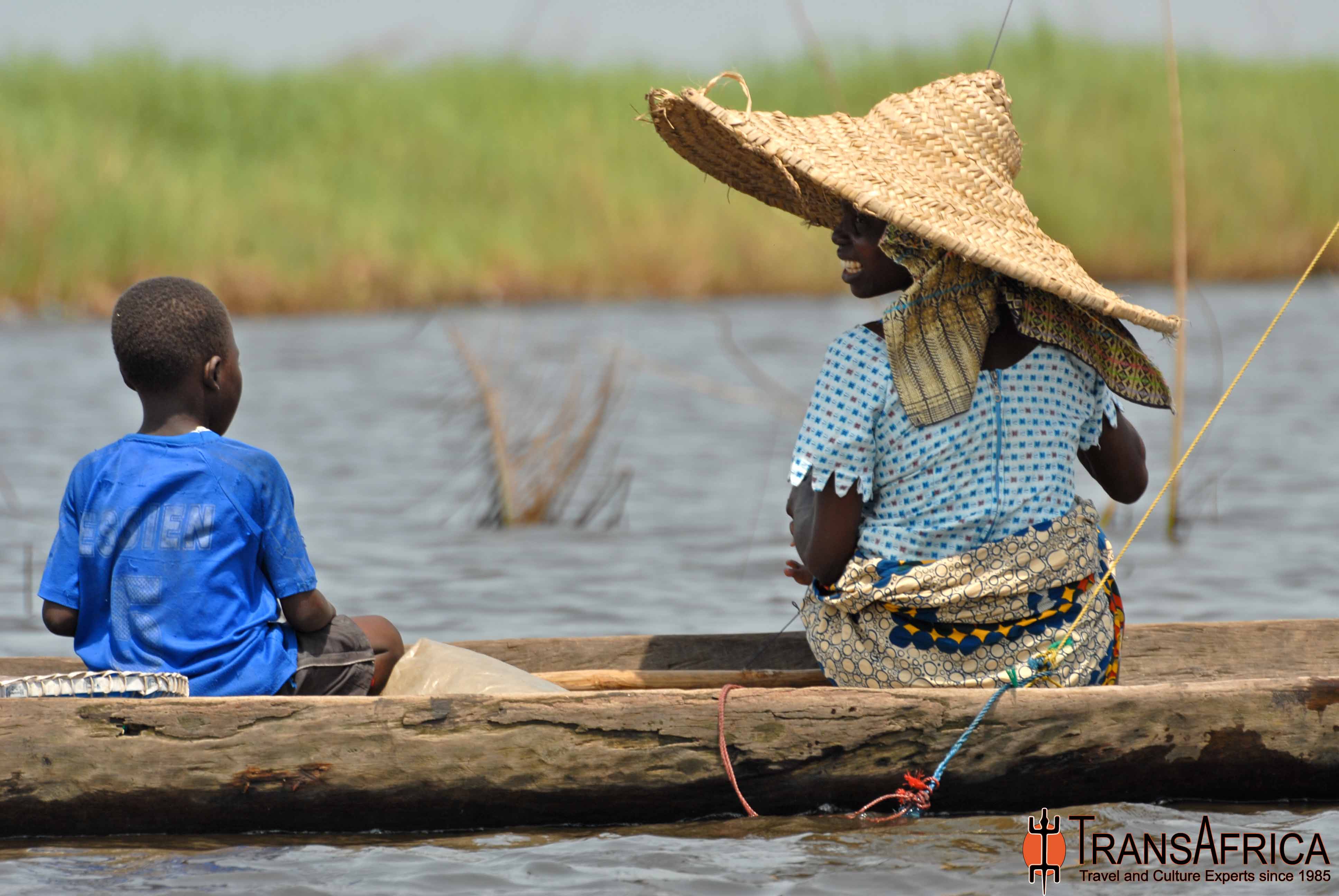
Dassa serves as the seat of an ancient kingdom established by Olofin in 1385, and within the town, remnants of this enduring dynasty still stand. Our stroll through the hills unveils sacred sites where kings were laid to rest—preserved to this day under the watchful guardianship of various voodoos. Later this morning, our journey continues northward. Here, we encounter the Dankoli Fetish, a distinctive shrine dedicated to ancient animistic practices that persist today. Thousands of small sticks, symbolizing countless prayers for bountiful harvests, joyful unions, safe childbirth, academic success, and more, surround and pierce the fetish. As prayers are answered, devotees return to fulfill their vows, leaving behind fresh traces of sacrifice, along with offerings of palm alcohol and oil—a testament to the efficacy of their supplications.
With luck, we may have the opportunity to encounter the Fulani people. These nomadic shepherds lead a simple life, with men tending to their herds and women managing camp chores, like making butter to sell. The Fulani are known for their unique beauty and facial tattoos, which hold cultural significance. As they go about their daily tasks, their graceful movements and keen eyes hint at their deep connection to the land and their nomadic lifestyle. They seem to move at their own pace, embodying a sense of patience and understanding of their surroundings.
Overnight: Hotel Donga/Motel Du Lac, Djogou (1 night) (B, L, D)
(Basic hotel, all rooms ensuite with aircon; no Twin rooms available)
Day 07: Djogou/Kara (Drive) (TOGO)
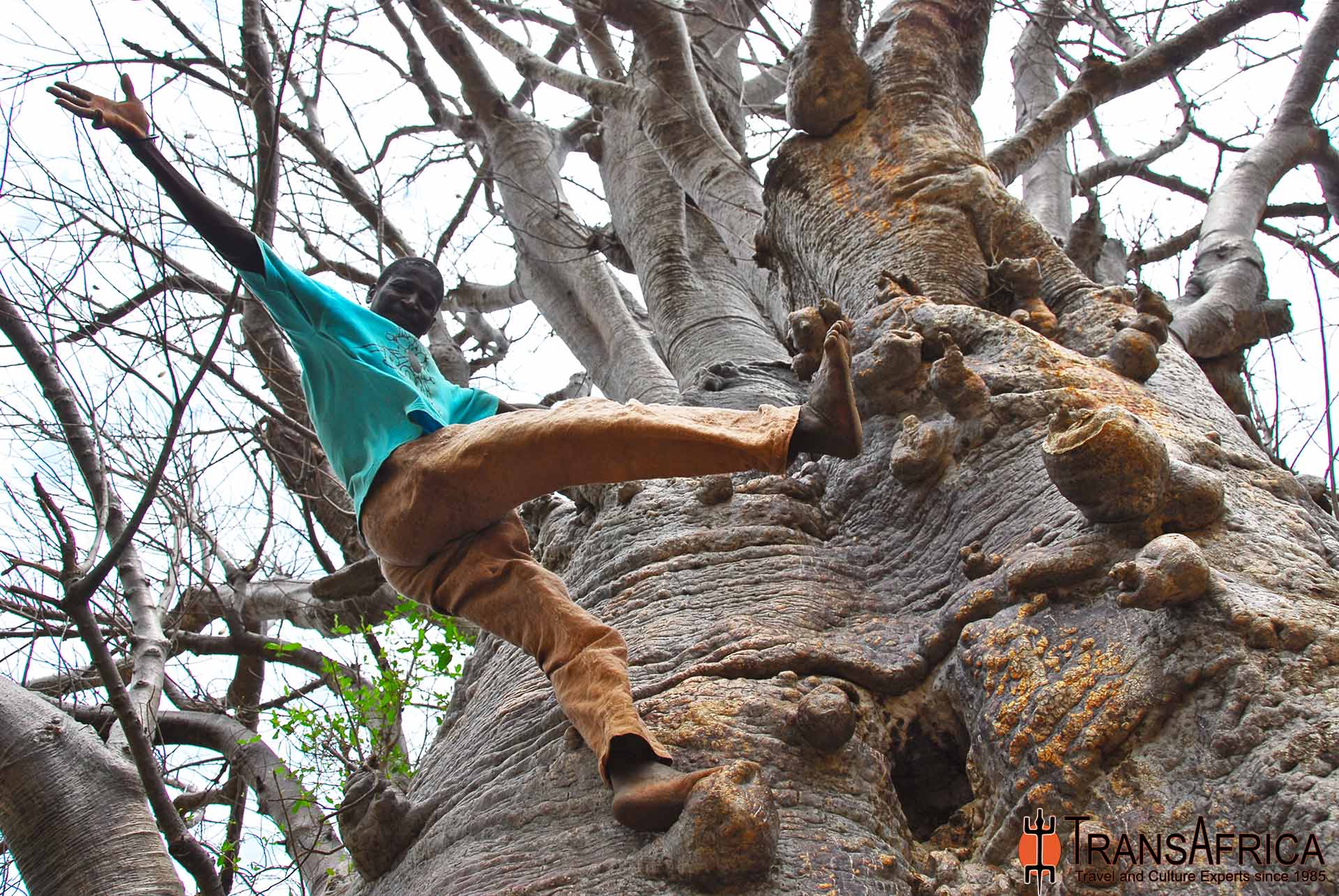
In the early morning, we explore a few ancient Taneka villages nestled on the mountainside that shares their name. The resident ethnic group has been living here since perhaps as far back as the 9th century, and the villages are veritable archaeological sites. The towns themselves are made up of round adobe huts and inhabited by young initiates, often naked save from their magical amulets, and older fetish priests, who only cover themselves with goatskin and carry a long pipe. (Please note: This excursion involves a minimum of three hours of walking up and down hilly terrain on rocky steps).
Later, we journey towards the Togo border. In the afternoon, we embark on an easy walk to discover Kabye villages nestled atop mountains, where we're greeted with warmth and hospitality. These Kabye dwellings, known as "Soukala," consist of several adobe huts interconnected by walls, each housing a patriarchal family. In these mountainous villages, women practice pottery using ancient techniques without the aid of a wheel, while men are skilled blacksmiths, forging iron using heavy stones instead of hammers and anvils as in the early stages of the Iron Age. We'll witness the process of shaping a hoe before arriving in Kara.
Overnight: Hotel Kara, Kara (1 night) (B, L, D)
(Ensuite rooms with aircon)
Day 08: Kara/Sokode (Drive)

Today, enter the land of the Tamberma peoples, who live in eye-catching adobe dwellings that look like small medieval castles. These structures are one of the most stunning examples of African architecture. In fact, they impressed famed architect Le Corbusier so much he called them “sculptural architecture”. The houses are built by hand, with layer after layer of clay and accents of round mud balls. Large phallic-shaped shrines at the entrance of the dwellings represent the peoples’ animistic beliefs. Food supplies, family and livestock alike are all kept inside the fortified house for safety, in case of attack by enemies. With permission granted to us by the elders, we have the unique opportunity to venture inside one of these homes. We learn about the cosmology behind its construction, with the ground floor and its darkness representing death and the ancestors, and the second floor, open to the sky, representing life. When a new baby is born, the grandmother will stay with them on this “life” floor until they determine which ancestor has “returned” in the baby. The baby is then allowed to come down from the second floor and start its new life.
In the evening, we arrive at the villages of the Tem tribe in time to experience their thrilling fire dance. At the centre of the village, a large fire lights up the silhouettes of the participants as they dance to the hypnotic drum beat. Eventually, protected by the voodoo fetishes, they leap into the glowing embers, picking up burning coals and even eating them without showing any signs of burns or pain.
Overnight: Hotel Lamirelle, Sokode (1 night) (B, L, D)
(Simple ensuite rooms with aircon; No Twin rooms)
Day 09: Sokode/Tamale (Drive) (GHANA)

This morning, we cross the border into Ghana, one of West Africa’s most well-known countries. We pass through the savanna region where the Dagomba tribe lives, in villages of round clay huts with thatched roofs. In one of these villages, we will meet with a very large settlement of “witches”, exiled from their villages. We will have the chance to speak with them about their life in the village and how they are protected by a special shrine.
Overnight: Gariba Lodge, Tamale (1 night) (B, L, D)
(Ensuite rooms with aircon)
Day 10: Tamale/Techiman (Drive)
Today, we journey to the south of Ghana, stopping en route to visit Fulani encampments. Travelling in the Brong Afo region, we will leave the main road and follow a track into a sacred forest. The people who make their home here consider the Monas and Colobus monkeys as their totems. As a result, the largest group of these animals in the world lives in this forest. A walk through the giant trees allows us to meet many sacred monkeys.
Overnight: Encom Hotel, Techiman (1 night) (B, L, D)
(Ensuite rooms with aircon)
Day 11: Techiman/Kumasi (Drive)
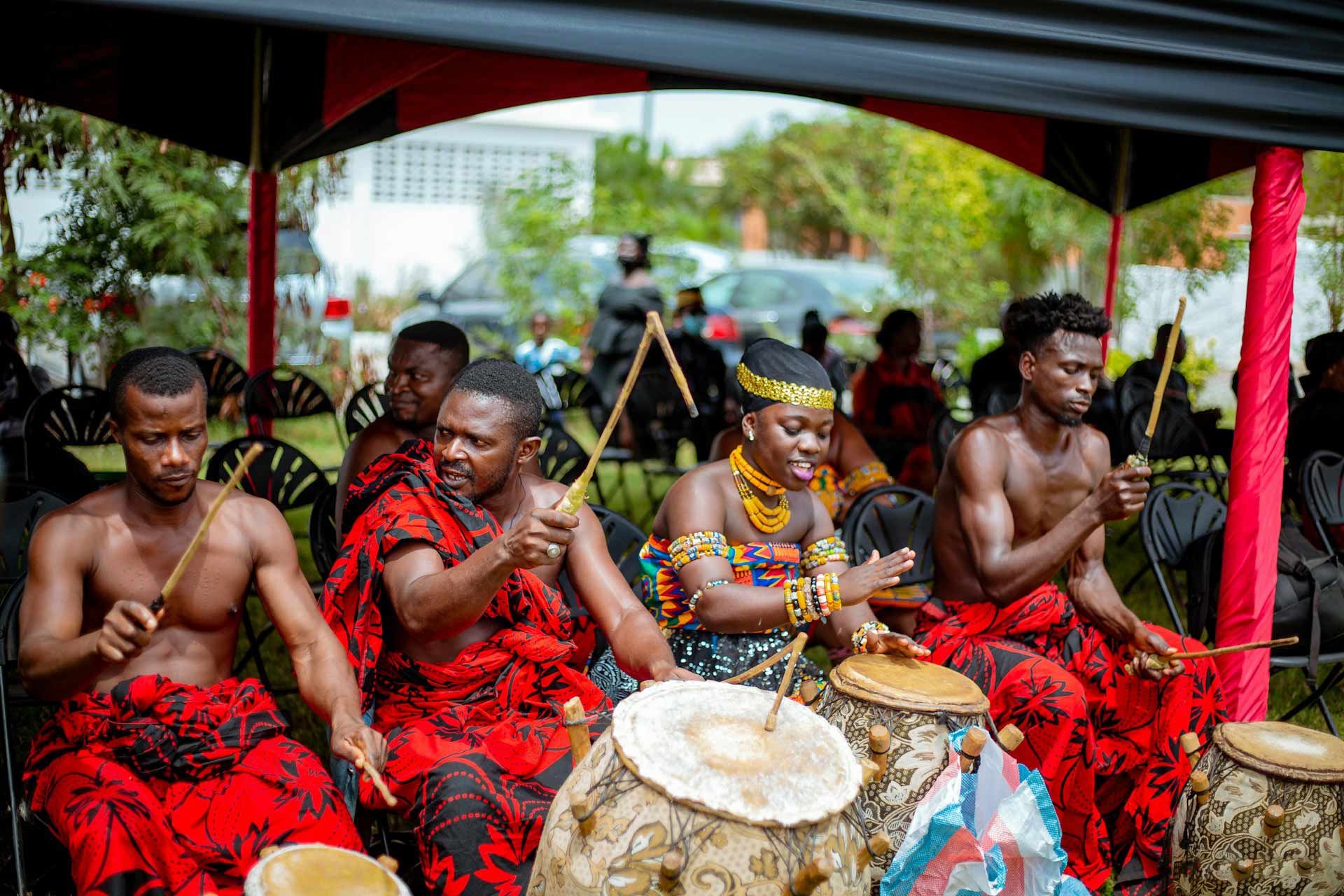
We continue on to Kumasi, the historical and spiritual capital of the ancient Ashanti empire. From 1670 to 1957, when the British Gold Coast became an independent Ghana, the Ashanti people were one of the most powerful kingdoms in Africa. Nowadays, Kumasi is the second largest city in Ghana. It boasts a unique central market that is one of the largest in Africa, offering traditional leather goods, pottery beads, textiles and more, along with countless varieties of tropical fruit and vegetables.
We will first visit the Ashanti Cultural Centre, offering a lovely collection of Ashanti artefacts in a reproduction of an Ashanti house. In the afternoon, we have the splendid opportunity to participate in a traditional Ashanti funeral (subject to availability). Funerals here are actually a festive celebration, as the family celebrates the deceased’s return to their ancestors. Mourners gather wearing red or black togas to celebrate their memory. The chief arrives surrounded by his court under the shade of large umbrellas, while drums give rhythm to dancers making intricate and symbolic movements.
Overnight: Miklin Hotel, Kumasi (2 nights) (B, L, D)
(Ensuite rooms with aircon; No Twin rooms available)
Day 12: Kumasi
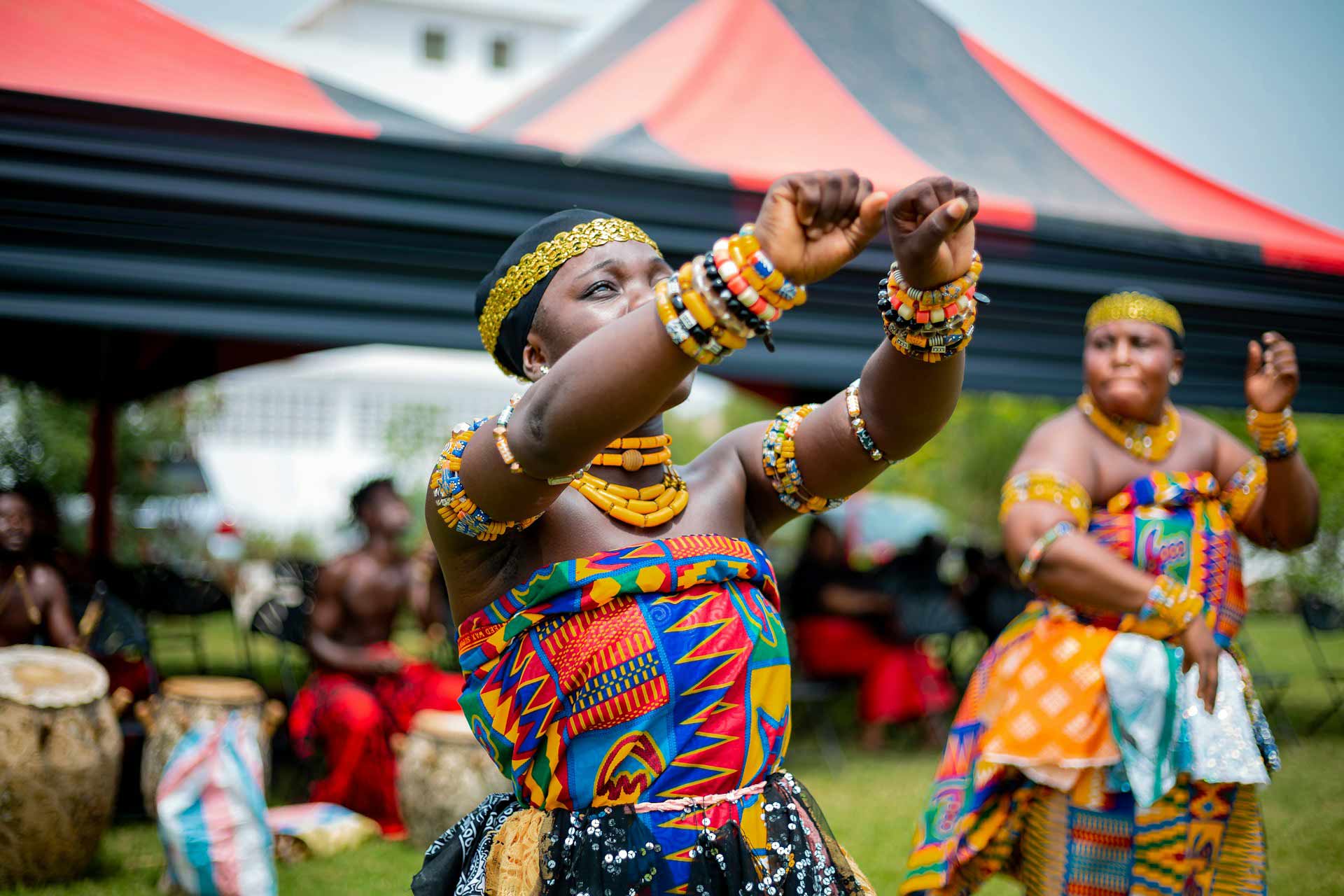
Today marks a very special occasion in Kumasi: the Akwasidae Festival takes place. In the Ashanti calendar, specific days each year are dedicated to this grand celebration at the Royal Palace. We will have the unique opportunity to witness a traditional ceremony in one of the few remaining African Kingdoms that still observes its ancient rituals in their entirety.
During the festival, the King takes his place beneath a magnificent, colorful umbrella adorned with vivid cloth and stunning Ashanti gold jewelry, renowned as masterpieces of African art. He is surrounded by dignitaries and elders, while the Linguist, holding the golden symbols of power, sits by his side. The positioning and distance from His Majesty symbolize the various roles and positions of power within the royal court.
The ceremony commences with a grand procession featuring attendants bearing gifts, storytellers recounting the deeds of past kings, drummers, ivory trumpet players, sword bearers, armed guards, carriers of ostrich feather fans, high fetish priests, and women dressed in vibrant red performing dances rich in erotic symbolism. The Queen Mother also graces the ceremony with her presence, surrounded by her court.
We will have the privilege of experiencing the splendor and the intense atmosphere of one of the last great African monarchies.
Additionally, we will visit the Royal Palace Museum, which houses a remarkable collection of gold jewels worn by the Ashanti court. (B, L, D)
Day 13: Kumasi/Anomabu (Drive)
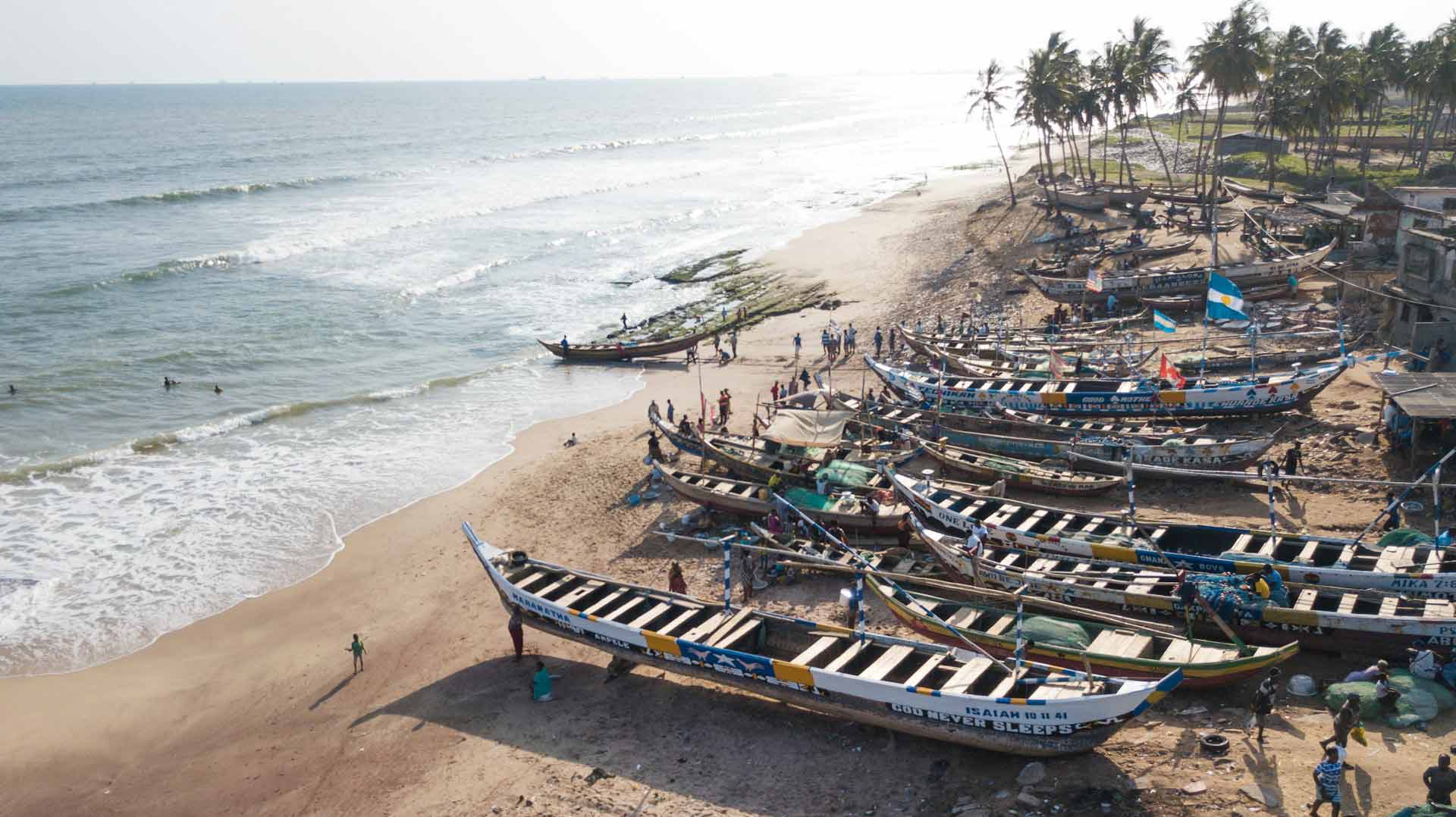
We make our way to Ghana’s beautiful coast. Formerly known as the Gold Coast, Ghana’s coastline is home to more than 50 ancient forts and castles, reminiscent of the ancient gold, ivory and slave trade that once happened here. We discover Elmina Castle*, the oldest European building in Africa. Built by the Portuguese in the 15th century, the castle has been used as a warehouse to trade gold, ivory, and eventually, slaves. The renovated castle we will explore today is a UNESCO World Heritage Site. The Dutch Cemetery within the castle dates back to 1806. Outside the castle walls, we take in a scenic fishing village with many large and vibrant boats. Each day, resident fishermen use these wooden boats fight the ocean waves and earn a living. In the old town, we admire the Posuban shrines, recognizing Asafo warriors who used to place their offering on these large, colourful statues. Wandering the alleyways and taking in their lively atmosphere sweeps us back to colonial times, letting us know what it might have been like to live here hundreds of years ago.
Overnight: Anomabu Beach Resort, Anomabu (1 night) (B, L, D)
(Oceanfront resort with comfortable beach bungalows including ensuite and aircon)
Day 14: Anomabu/Depart Accra (Drive)
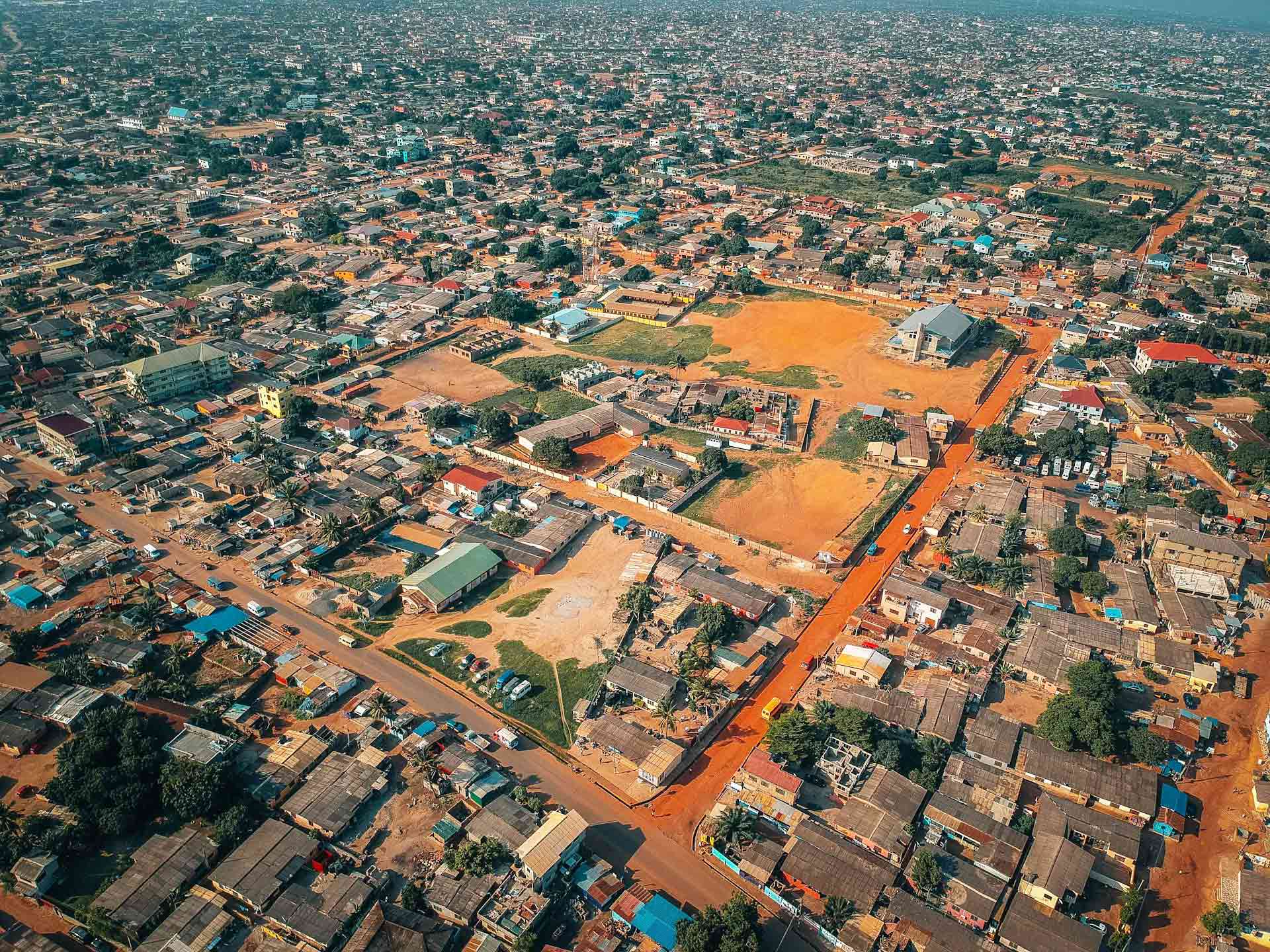
We continue on to Accra this morning. Despite its fast-paced development of the last few decades, Accra has kept is unique identity. As the capital of Ghana, it offers a lavish administrative area dotted with elegant villas dating from the first half of the 19th century. We first explore James Town historic neighbourhood, inhabited by the Ga people. This unique village within a city is one of the oldest districts in Accra, emerging as a community in the 17th century. We next visit a workshop specializing in fantastical “fantasy coffins”. Started in Accra, these flamboyant coffin designs are now collected worldwide and exhibited in museums. The handcrafted coffins take the shape of animals, cars, airplanes, fruit, and more!
In the evening, we are transferred to the airport in time for our departure flight.
Day use room until 6:00 PM (B)
(Ensuite room with aircon)
B=Breakfast, L=Lunch, D=Dinner
Departure Dates & Prices
We accept payments in US$, CA$ as well as in other convertible currencies like EUR, AUD and GBP. Tour prices have been costed in US$. CA$ price shown below is an indicative amount reached at by using the conversion rate at the time of web posting and will be applicable if there is no change in the conversion rate. Should the currency conversion rate change, the US$ pricing will prevail. Bestway Tours & Safaris offers a conversion rate protection. Once full payment has been received and no modification has been made to the tour itinerary, we will honour that rate. For complete payment procedures, please click here
| 2025 | Per Person on Twin Sharing |
Single Room Supplement |
Estimated Airfare (FROM)+ | |
|---|---|---|---|---|
| Departure(s) | East Coast | West Coast | ||
| Jan 08 to 21, 2025 | ||||
| 02 – 05 passengers | US$ 5335 | US$ 785 | - | - |
| 06 and more passengers | US$ 4315 | US$ 785 | - | - |
| 2025 | Per Person on Twin Sharing |
Single Room Supplement |
Estimated Airfare (FROM)+ | |
|---|---|---|---|---|
| Departure(s) | East Coast | West Coast | ||
| Jan 08 to 21, 2025 | ||||
| 02 – 05 passengers | CA$ 7363 | CA$ 1084 | - | - |
| 06 and more passengers | CA$ 5955 | CA$ 1084 | - | - |
Notes
- Yellow Fever certificate is mandatory and malaria prophylaxis is highly recommended.
- Visas required: Togo (double entry); Ghana & Benin (single entry).
- Travel insurance is mandatory.
- Luggage should be 20 kilograms (45 pounds) or less. Duffle bags are preferred.
- On tour days 6 & 8, lodges have very limited Twin rooms (i.e. rooms with 2 separate beds). The choice is to go either for a double-bedded room or request for a single room. If you would like single room at these locations, the supplement is US$ 100 per person.
Inclusions
- 13 Nights' accommodation as mentioned or similar, including hotel taxes
- 37 Meals as mentioned (B=Breakfast, L=Lunch, D=Dinner)
- All sightseeing and transfers by private transportation (minibus/microbus)
- Services of local multilingual guides
- Entrance fees to sites, dance performances (when available), museums and monuments
- Park fees for safaris in 2024 have been included in your tour cost. However, if a new levy or an increase in the existing fee structures is introduced and is made effective for 2024, then the increase in cost will be charged separately to all travellers
- Mineral water in vehicle during the visits
- Any airfares
- Insurance/visas
- Tips/gratuities
Participants
This tour operates on a minimum of 02 and a maximum of 16 participants
Customised Itinerary
If you would like to have a tour on dates other than the above ones or with a customised itinerary, please contact us and we will be happy to work out an exclusive program for you.
Contact Info
You may e-mail us at bestway@bestway.com or call 1-604-264-7378.
Residents of U.S.A./Canada may call us toll free at 1-800-663-0844.
Inquire About this Trip
Tour Application Form

